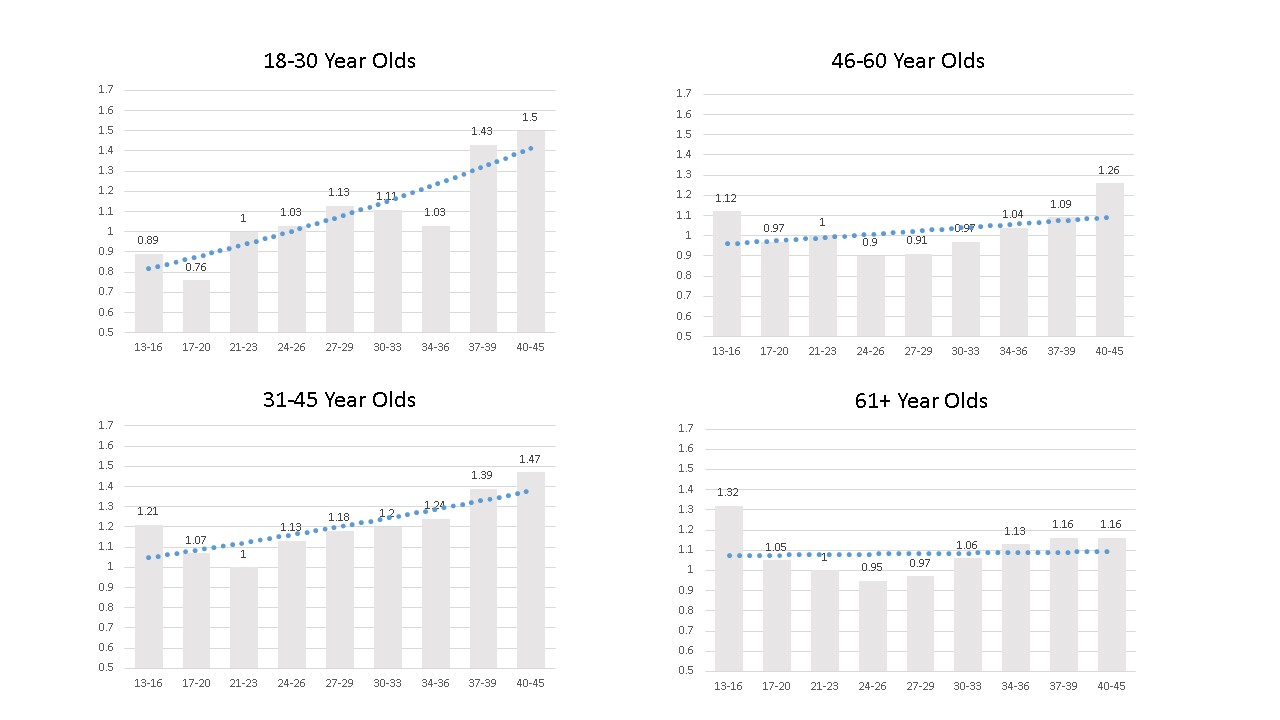Effects of BMI on Kidney Transplant Outcomes are Highly Modified by Patient and Donor Characteristics
J. Schold1, J. Augustine2, A. Huml2, R. Fatica2, S. Nurko2, A. Wee3, E. Poggio2
1Cleveland Clinic Foundation, Cleveland, OH, 2Nephrology, Cleveland Clinic Foundation, Cleveland, OH, 3Surgery, Cleveland Clinic Foundation, Cleveland, OH
Meeting: 2020 American Transplant Congress
Abstract number: C-041
Keywords: Kidney transplantation, Obesity, Risk factors
Session Information
Session Name: Poster Session C: Kidney: Cardiovascular and Metabolic Complications
Session Type: Poster Session
Date: Saturday, May 30, 2020
Session Time: 3:15pm-4:00pm
 Presentation Time: 3:30pm-4:00pm
Presentation Time: 3:30pm-4:00pm
Location: Virtual
*Purpose: Body Mass Index (BMI) is a well-established risk factor for transplant outcomes and high BMI is a commonly used relative contradiction for used for patient eligibility. However, BMI is a relatively coarse measure for health status and the clinical impact and risk associated with BMI levels may be varied by other patient comorbidities and demographic characteristics.
*Methods: We evaluated 190,547 adult solitary kidney transplant recipients from the SRTR data from 2008-2018 and examined the association of BMI levels on outcomes for recipients using interaction terms and stratified analyses based on demographic, clinical and donor characteristics. We tested for significant relative differences of BMI on overall graft loss and patient death.
*Results: In the overall population, BMI demonstrated a significant ‘J-Shape’ risk profile with elevated risks for overall graft loss among low BMI recipients (BM1<20kg/m2) and an increased risk among obese and morbidly obese recipients. However, using multivariable models with interaction terms with BMI, several factors significantly modified the effects of BMI including age, diabetic status and race (all interactions p<0.01). Effects of BMI for age are displayed in Figure1 demonstrating a marked relative effect of obesity among younger recipients which attenuated with age and shifted to a marked risk for low weight among recipients >60. Similar differential effects included a significantly lower risk of obesity among African Americans relative to Caucasians, lower risk of obesity among diabetics relative to non-diabetics and a higher risk associated with obesity with lower quality (higher KDPI) donors.
*Conclusions: BMI has highly variable association with post-transplant outcomes for kidney transplant recipients. These results may be important to incorporate to optimize care and stratify risk. In addition, they suggest that contraindications to transplant should not be guided by absolute BMI cutoffs but rather personalized to other transplant characteristics.
To cite this abstract in AMA style:
Schold J, Augustine J, Huml A, Fatica R, Nurko S, Wee A, Poggio E. Effects of BMI on Kidney Transplant Outcomes are Highly Modified by Patient and Donor Characteristics [abstract]. Am J Transplant. 2020; 20 (suppl 3). https://atcmeetingabstracts.com/abstract/effects-of-bmi-on-kidney-transplant-outcomes-are-highly-modified-by-patient-and-donor-characteristics/. Accessed March 1, 2026.« Back to 2020 American Transplant Congress

